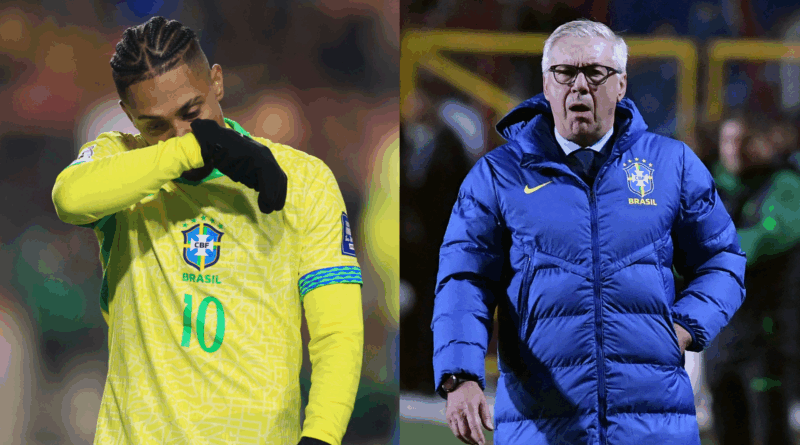Raphinha Furious With Brazil Boss Ancelotti Over Bolivia Clash
Raphinha furious with Brazil boss Carlo Ancelotti has become one of the biggest talking points following Brazil’s recent World Cup qualifier against Bolivia. The Barcelona winger was left angered by Ancelotti’s decision to play him at the notoriously high altitude of La Paz, a move Raphinha believes was detrimental both to his performance and his well-being. With World Cup qualification already assured, the decision has sparked debate among fans and pundits alike about player management and the risks of playing at extreme conditions.
Raphinha Furious With Brazil Boss Ancelotti: The Incident Unfolds
From the outset, the focus was on Brazil’s trip to Bolivia, particularly due to the unique challenge posed by the Estadio Hernando Siles, situated 4,150 meters above sea level. It is one of the most challenging environments in world football, known for draining even the fittest athletes. Despite the team having secured their qualification for the tournament, Carlo Ancelotti opted to include Raphinha in the matchday squad, bringing him on in the second half as Brazil sought to turn the game around after a surprising Bolivian lead.
Raphinha’s frustration was evident after the final whistle. Insiders report that he was visibly upset in the dressing room, feeling that being played in such extreme conditions was unnecessary and potentially harmful. The winger reportedly made his feelings known to Brazil’s coaching staff, believing that his health and club commitments should have taken priority given the minimal stakes of the match.
The Risks of Playing at Extreme Altitude
Playing at high altitude, especially above 3,000 meters, poses significant physical risks. Footballers experience reduced oxygen intake, leading to fatigue, dizziness, and a greater likelihood of muscle injuries. Medical experts have long warned about the dangers, with some clubs even requesting their players be rested for matches in such locations. For Raphinha, who has already had a demanding season with Barcelona, the additional strain of competing at 4,150 meters raised concerns about his ability to recover fully for his club duties.
Carlo Ancelotti’s decision to field Raphinha has, therefore, raised questions about player welfare versus international duty. While representing the national team is a matter of pride, the circumstances of this match have led to widespread support for Raphinha’s stance. Many fans argue that resting key players would have been the wiser choice, especially with qualification for the tournament already secured.
Raphinha’s Reaction: More Than Just Frustration
Raphinha’s reaction was not simply about a single match; it reflected a growing trend among top European-based South American players, who often face grueling travel schedules and must adapt quickly to varying football environments. The winger, who has been a key figure for both Barcelona and Brazil, is known for his dedication and professionalism. However, his anger at being risked in what he considered an inconsequential game highlights the delicate balance international managers must strike.
Supporters of Raphinha point out that players’ voices need to be heard, especially when it comes to their health. While Ancelotti is regarded as one of the most respected managers in world football, this episode may serve as a reminder that communication and player welfare should always be at the forefront of team decisions.
The Ancelotti Perspective: Balancing Team Needs And Player Welfare
For Carlo Ancelotti, managing Brazil means balancing the desire to maintain winning momentum with the responsibility of looking after his players’ long-term fitness. The defeat to Bolivia at altitude will be dissected not only because of the result but also for the decisions made regarding squad rotation and player selection.
Ancelotti might argue that every match is an opportunity to test his squad and build chemistry ahead of major tournaments. However, the reaction from Raphinha—furious with Brazil boss for the perceived risk—shows that not all players view these matches the same way, especially when there’s little on the line.
Brazil’s Defeat: What It Means Going Forward
The loss to Bolivia is unlikely to impact Brazil’s World Cup plans, but it does shine a spotlight on issues that could affect team harmony. Raphinha’s public display of frustration could spark a larger conversation among the squad about how best to manage fitness and rotations, particularly when playing in extreme conditions.
Fans will also be watching closely to see how Ancelotti navigates future selection dilemmas. Whether this incident leads to a change in approach remains to be seen, but it is clear that Raphinha’s bold stance will resonate with many of his peers.
Opinion: Raphinha Has a Point—Player Welfare Should Come First
In my view, Raphinha has every right to be frustrated with the decision. With Brazil’s place in the World Cup already secure and the unique dangers posed by La Paz’s altitude, there was little to gain and much to risk. Modern football places enormous demands on its stars, and international managers must take into account the physical toll of these high-risk fixtures. Prioritizing player welfare isn’t just about preserving club assets—it’s about respecting the individuals who put their bodies on the line for both club and country.
For more news and the latest updates on international football, visit for more news.
Your global gateway to nonstop football coverage:
News Goal
Share this content:

